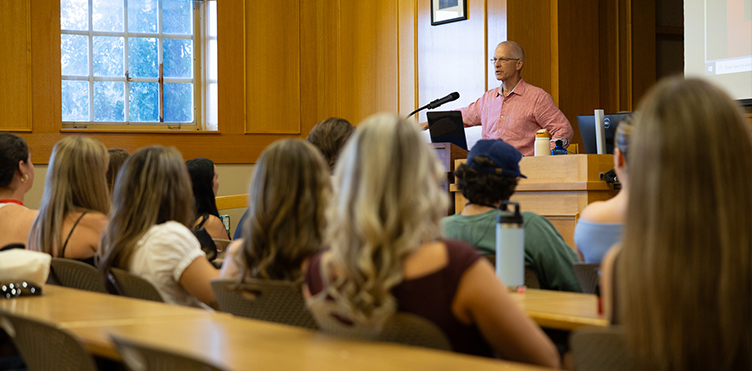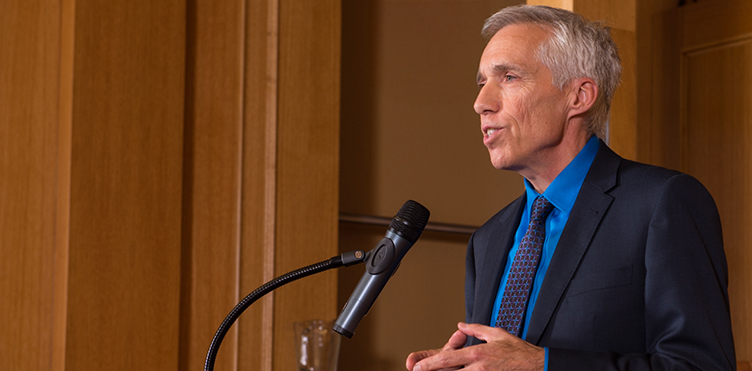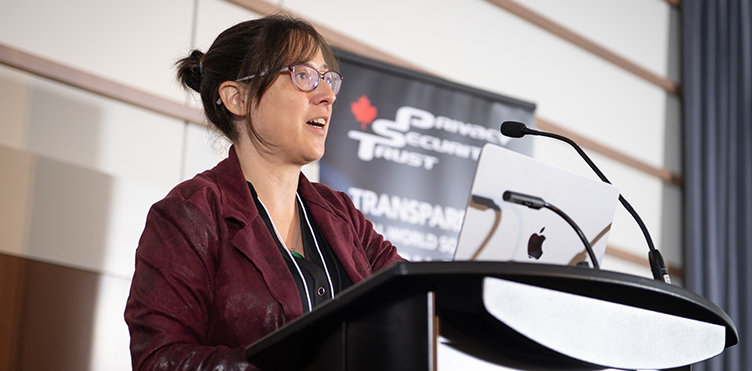
The legal profession is evolving faster than ever. Artificial intelligence is no longer a distant fantasy—it’s reality, changing how lawyers research, analyze, and practice law. Through the AI and Pedagogy Committee, UNB is taking the first steps to embed AI directly into the curriculum, giving students hands-on experience with the tools that are transforming the profession. The result? Graduates who aren’t just learning the fundamentals of law, but who are also being equipped to thrive in an AI-assisted legal world.
The committee—made up of Professors Norman Siebrasse, Argyri Panezi, and John Kleefeld, along with Technology Coordinator David Anderson—has a clear goal: to create a roadmap that ensures UNB Law can both produce AI-ready lawyers and continue teaching effectively in an AI environment.
For Prof. Siebrasse, the AI shift was sudden, but significant, marked by the release of ChatGPT-4, the large language model developed by OpenAI.
“With GPT-4, AI leapt from being ‘a better Google’ to something fundamentally different. We began to hear more about the profession's use of AI in practice. What we’re hearing is that: ‘AI won’t replace lawyers, but lawyers with AI will replace lawyers without AI.’ The point is, this isn’t speculative—it’s already happening in practice, and it’s only going to accelerate as the technology keeps improving.”
The committee acknowledges that three years from now, when UNB Law’s current 1L class crosses the stage at graduation, AI will be even more deeply embedded in the profession. That means preparing students now for a world where practicing law will almost certainly mean practicing law with AI.
The committee’s work is focused on five broad themes: AI and assessment, AI and pedagogy, AI in the practice of law, implementation, and external leadership.

The committee sees this as the most immediate challenge. Certain assessment formats, such as in-class, closed-book exams, remain largely unaffected. But traditional take-home essays and papers can now be easily generated with AI. That raises a pressing question: how can professors assess student work in a rigorous way?
“That doesn't mean you don't give a take-home paper,” explains Prof. Siebrasse. “Maybe you give a take-home paper and say, we expect you to use AI. We want you to use AI, but that doesn't mean it's going to be easier. It's going to be harder because the very minimum we expect is an AI-generated paper. Maybe that paper would have gotten a B years ago, but with today’s AI tools, that’s going to be a D. AI is going to raise the bar on papers.”
The committee is also exploring new approaches, like evaluating the quality of a student’s prompts and their use of AI tools. Their goal is to maintain integrity and rigor in assessment, while acknowledging the reality of AI. For example, in Prof. Kleefeld’s legal writing course, a student who had never used generative AI expressed interest in trying it for a capstone project.

“Her project was a motion for a derivative action, a special type of procedure in corporate law,” shares Prof. Kleefeld. “I encouraged her to do successive prompting to draft a fact scenario, refine it until it was sufficiently robust, and prepare the initial draft of the motion and supporting affidavit.”
The student then analyzed and further refined the scenario and the draft documents, and after finalizing them, submitted everything along with a link to the dialogue with ChatGPT and her analysis of the strengths and weaknesses of this approach.
“Initially fearful of AI, this student is now a convert to its beneficial uses in law practice,” Prof. Kleefeld observes.
For the committee, AI isn’t just something to defend against—it’s a tool that can enhance teaching and strengthen knowledge transfer. Prof. Siebrasse, for example, plans to incorporate AI into his Foundations course to support retrieval practice.
“Research shows retrieval practice is a very effective way of learning. Students often just re-read their notes. Instead, I’ll encourage them to feed their notes into AI, ask it to generate practice questions, and then quiz themselves. That’s a more active, durable way of retaining material. AI can also help us generate practice problems with variations, or even assist with grading, which in turn allows us to give more feedback and create more opportunities for active learning.”
UNB Law has always been a school that prepares students for practice, and practice is changing. Lawyers are already using AI, and that adoption is only going to accelerate. Part of the committee’s work is to identify the skills students will need to succeed in an AI-assisted profession. This involves engaging with practitioners to understand how AI is being used today—whether in case analysis, drafting, or research—and exploring the related challenges, such as privacy, confidentiality, and ethics.
“It’s a matter of how we teach, and what we teach,” observes Prof. Siebrasse. “There's a whole research project there of figuring out how the profession is using AI in order to figure out what we need to teach the students to get them ready for AI-assisted practice. So that's part of the project, the committee will connect with practitioners to find out how AI is being used and how it might be used.”
Big ideas only matter if they make it into the classroom. For the committee, that means figuring out how to turn AI teaching strategies into everyday practice—developing the resources to put those ideas into action.
In Prof. Siebrasse’s words: "A number of us on faculty are very keen on AI, but not everyone has the time or inclination to focus on it—and that doesn’t mean they’re rejecting it or being Luddites. It just means we need to make it easier for them to use. Developing strong AI pedagogy takes work, and refining it takes even more. Our job is to package that in a way that makes it simple for faculty to adopt—creating training, resources, and examples they can plug into their courses. Helping colleagues adopt AI in a way that works for them is one of the trickiest but most important pieces.”
For decades, UNB Law has been at the forefront of legal research and innovation. With AI reshaping the profession, the faculty sees an opportunity not just to keep pace with industry, but to lead—by graduating students ready to drive this transformation from day one.
“Imagine a small firm in New Brunswick wanting to use AI but not having the time to sort it out,” says Prof. Siebrasse. “If they hire a UNB Law grad who can say, ‘Here’s how you do it,’ that makes our students incredibly attractive.”
The committee is also focused on continuing professional education for the bar—helping practicing lawyers understand how to implement AI responsibly, while navigating its legal and ethical boundaries.

As the committee considered the role of AI in New Brunswick’s legal landscape, one theme quickly emerged: the importance of language. Professor Argyri Panezi explains that because legal practice is fundamentally rooted in language, the use of AI-powered tools for translation carries particular weight in bilingual and multilingual jurisdictions.
“As AI-powered tools for text-to-text translation continue to evolve and expand in the legal field, it is crucial to consider their implications for bilingual (and multilingual) jurisdictions. In New Brunswick—and Canada more broadly—careful thought must be given to how automated translation and interpretation technologies are/will be used, particularly to ensure the integrity of legal language is preserved in both English and French. The Committee is committed to exploring these questions in depth and collaborating with students to develop innovative solutions moving forward.”
As much promise as AI holds for the profession, the committee is realistic about the challenges it brings—both in terms of skills development and professional responsibility. For future lawyers, the first hurdle is building confidence without complacency. Students need to be familiar enough with AI that they not only know it can “hallucinate,” but also develop judgment about when to rely on it and when to dig deeper.
Ethics and professional responsibility are also central concerns. Questions such as whether client information can be uploaded into a web-based AI tool are, at their core, issues of confidentiality and competence.
“The balance here is largely a matter of applying and adapting the existing rules—primarily around confidentiality, but also competence—to the AI context,” notes Prof. Siebrasse. “The principles are already there; we just need to interpret them for this new environment.”
Despite these concerns, the opportunities are undeniable. AI has the potential to be a “competence multiplier,” helping lawyers deliver work faster, at lower cost, and with greater efficiency. And because law is such a language-driven discipline, the profession is especially well-positioned to benefit from the strengths of large language models.
Still, not all consequences will be positive. Traditionally, junior lawyers built their skills through research and memo-writing, tested and refined under the supervision of senior lawyers. AI threatens to disrupt that apprenticeship model, performing much of the work that once trained new graduates. That raises a pressing question for the profession: if junior lawyers no longer develop those foundational skills on the job, how will they grow into the senior lawyers of the future?
“This is the million-dollar question,” explains Prof. Siebrasse. “If junior lawyers don’t get the chance to develop those foundational skills, how do they grow into the senior lawyers of the future? That, to me, is the unanswered question.”
Looking ahead, the committee is optimistic that UNB Law will rise to the challenge. The forthcoming report on AI policy and integration will outline how the school plans to harness AI as a seamless and innovative part of legal education.
For Prof. Siebrasse and the committee, the goal is clear: “What matters is that students are immersed in AI-assisted learning as part of their everyday work. Just like they learn the law by writing assignments, solving problems, and testing ideas, they’ll learn the strengths, weaknesses, and limits of AI by actually using it in those contexts. My hope is that integration becomes so seamless that a student can come here, engage with the curriculum as designed, and graduate ready to thrive in a profession where AI is part of the landscape.”